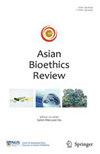A Preliminary Study to Explore the Informed Consent Approach and the Ethical Challenges in the Malaysian Biobanking for Research
Abstract
Abstract
Since 2005, Malaysia has established several biobanks to keep in line with the advancement of biomedical research and development of biobanks in other countries such as the UK and the USA. Despite the establishment of several biobanks in Malaysia, little is known about the informed consent approach in biobanking research and its ethical challenges. This study aims to identify the approach in obtaining informed consent in the Malaysian biobanking for research and explore its ethical challenges. Using non-probability purposive sampling, an in-depth interview with the key informants was conducted in Klang Valley. Based on the interviews, broad consent is the main approach used in obtaining informed consent in biobanking for research in Malaysia and five major ethical challenges were identified. These challenges include the informants’ opinion on the current informed consent approach, understanding participants’ rights, the role of the research ethics committee, biobanking governance in Malaysia, and informants’ knowledge and awareness. In summary, there is a lack of understanding among those involved in biobanking on the ethical, legal, and social aspects of biobanking for research in Malaysia.

 求助内容:
求助内容: 应助结果提醒方式:
应助结果提醒方式:


